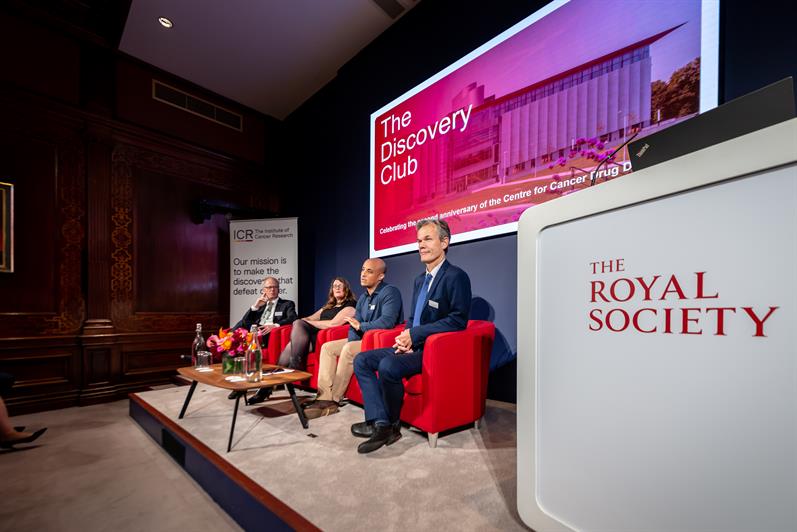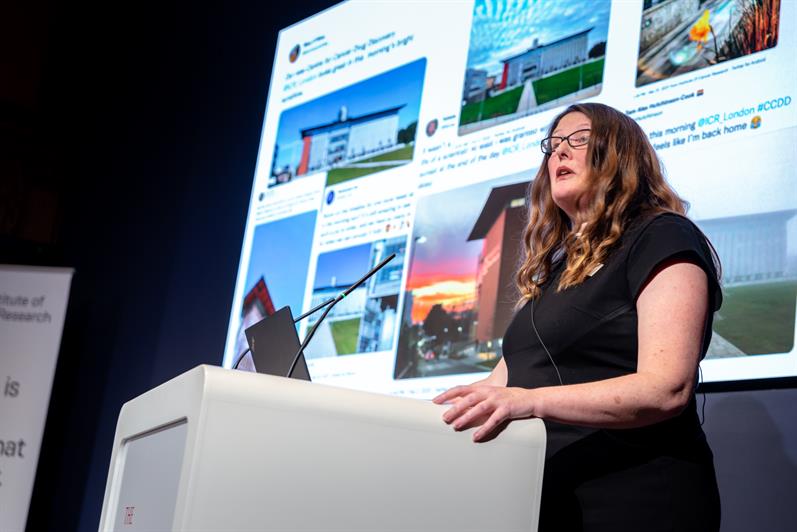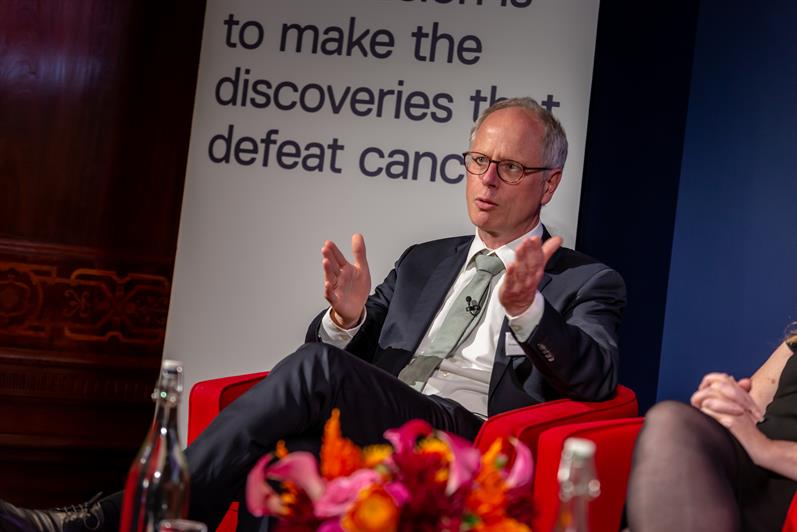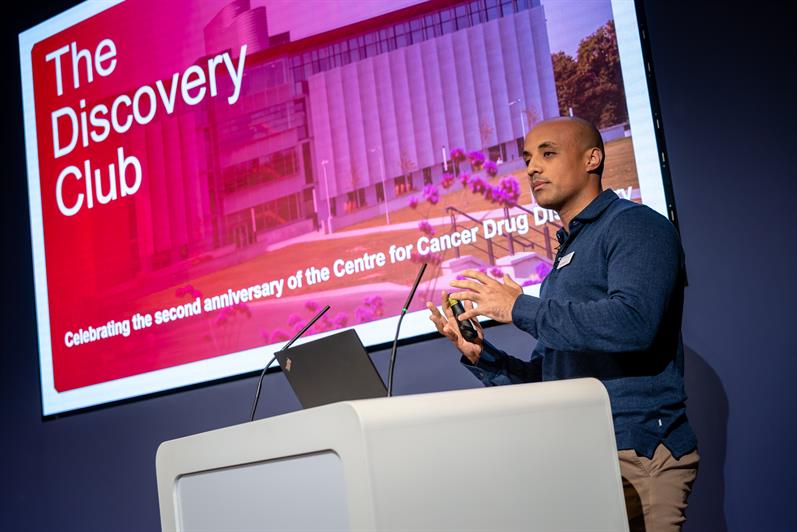
Image: From left to right - Professor Swen Hoelder, Dr Olivia Rossanese, Dr Habib Bouguenina and our Chief Executive Professor Kristian Helin at the Discovery Club.
Members of the ICR’s Discovery Club gathered at The Royal Society to hear about our new five-year research strategy and to mark two years since the opening of our pioneering Centre for Cancer Drug Discovery.
Our Chief Executive, Professor Kristian Helin, opened the event with an exclusive opportunity for guests to hear about the ICR's new strategy, highlighting how we will continue to pursue our mission to defeat cancer and maximise the impact of our research for patients.
Members then heard from Dr Olivia Rossanese, Professor Swen Hoelder and Dr Habib Bouguenina who reflected on the achievements of scientists at the Centre for Cancer Drug Discovery following its opening two years ago. They also showcased some of the cutting-edge work happening there, including research into the use of targeted protein degradation technology to improve cancer treatments.
‘A beacon in the dark’

Image: Dr Olivia Rossanese, Director of our Division of Cancer Therapeutic, at the Discovery Club.
The Centre for Cancer Drug Discovery which opened to researchers in November 2020, houses the Division of Cancer Therapeutics and the Centre for Evolution and Cancer. Bringing together both drug discovery and evolutionary scientists, the building hosts the world’s first ‘Darwinian’ drug discovery programme, with the aim of tackling cancer’s ability to evolve resistance to treatment.
Dr Olivia Rossanese is the Director of our Division of Cancer Therapeutics. She leads a team based at the Centre, where they are working to create new ways of treating cancer that can overcome drug resistance and benefit patients.
At the event, Dr Rossanese reflected on our success in drug discovery to date. She showcased some of the 21 drug candidates that we've discovered since 2005, and looked back on the discovery and development of the drug abiraterone, which has extended the lives of hundreds of thousands of men with advanced prostate cancer around the world.
Dr Rossanese led members of the Discovery Club through the history of the Centre, from its initial proposals in 2015 to the latest centres created in the building. These include the Centre for Target Validation and the Centre for Protein Degradation – which aim to discover novel therapies to treat cancer.
She talked about the challenges our scientists faced during the coronavirus pandemic, and the hope the new building symbolised:
“As we came out of the pandemic, the building represented a lot of things to a lot of people, about being able to go back into the lab and get some work done… The building gave us time and space at a time when we didn’t have either. It allowed us to get our research restarted and to continue making these important discoveries. Metaphorically, and actually, the building was a shining beacon in the darkness during a very, very grim time.”
Take a video tour of the Centre for Cancer Drug Discovery to learn more about the building and the research taking place here.
Targeting cancer using protein degradation

Image: Professor Swen Hoelder is the Head of Chemistry and Interim Head of The Centre for Protein Degradation, at the Discovery Club.
Professor Swen Hoelder is the Head of Chemistry and Interim Head of The Centre for Protein Degradation. His research looks at ways to ‘hijack’ the waste disposal process in cells, in order to remove particular proteins required for cancer cells to survive.
The Centre for Protein Degradation was established in early 2022 thanks to a £9 million donation from Ruth and David Hill - the largest ever single donation to the ICR. The Centre aims to develop small molecules that are able to wipe out a protein from a cancer cell by using the cell’s own disposal system. These small molecules act as the glue between the targeted protein and a system in the cell used to remove and degrade unwanted proteins. Removing these targeted proteins can cause cancer cells to stop functioning correctly and die.
Professor Hoelder compared this concept to the process of taking a car to a junkyard and dismantling it, so it can no longer run. He described it as a huge opportunity for cancer patients, as these degrader type molecules may be able to target proteins once considered ‘undruggable’ by most targeted cancer drugs, which tend to be small molecule inhibitors. This opens a range of new and exciting strategies to target cancer.
Adapting current treatments

Image: Dr Habib Bouguenina, staff scientist in the Target Evaluation & Molecular Therapeutics Team, at the Discovery Club.
Dr Habib Bouguenina is a staff scientist in the Target Evaluation & Molecular Therapeutics Team where he aims to understand different ways of reprogramming a cell’s disposal system. He uses targeted protein degradation to develop tools to aid research and improve current therapies.
Dr Bouguenina explained to members how he designs degrader molecules to selectively remove proteins from cancer cells so they are more targeted with fewer side effects. Using techniques such as x-ray crystallography alongside biological experiments, he can identify the fewest number of features required by a degrader molecule to have an effect. Being able to selectively degrade proteins in a cell helps to unpick how cancer cells function and how we can use these degrader molecules to better treat cancer patients.
Help us continue our vital research
Our Discovery Club members are part of our generous community of donors, who help us to drive forward our research. They played a key role in making the Centre for Cancer Drug Discovery a reality. Focused philanthropic investment in key organisational priorities such as improving the outlook for people with cancers of unmet need, training future research leaders, and investing in cutting-edge technology is vital for the continuity of our research.
These Discovery Club events are opportunities for members to hear directly about the ICR’s research from our scientists and learn how their support is making an impact.
Hannah Joyce, Deputy Director of Philanthropy, said: “It was wonderful to see so many of our donors and to welcome new members of the Discovery Club to the event. We are incredibly grateful for their generosity and with their help, the ICR can pursue our world leading research into a range of so many important fields.”
To learn more about Discovery Club or if you are interested in becoming a member, please contact Hannah Joyce, Deputy Director of Philanthropy.
Philanthropic donations can make a transformational difference to our cancer research and help improve the lives of people with cancer. Find out more about its impact.